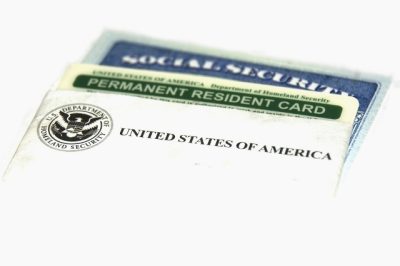Immigration at the Border

A Much-Needed Spotlight on Families Ripped Apart by Deportations
On December 12, dozens of children delivered thousands of letters to Capitol Hill, calling upon lawmakers to stop the senseless division of families that is caused by the deportation of mothers and fathers who are not a threat to anyone. The event was part of “A Wish for the Holidays,” a campaign with a simple but powerful message: “Every day, families across the country are separated by deportations and immigrant detentions. 5.5 million children live with the fear that a parent could be deported, and these policies threaten the fabric of all of our communities. It just isn’t right.” Read More

Falling Through the Cracks
The Impact of Immigration Enforcement on Children Caught Up in the Child Welfare System One of the many consequences of an aggressive immigration enforcement system is the separation of children, often U.S. citizens, from their unauthorized immigrant parents. Take the case of Felipe Montes, a father who has spent the past two years fighting to reunite with his three young children, who were placed in foster care in North Carolina following Montes’ deportation to Mexico in late 2010. Such cases only scratch at the surface of a growing problem. Our immigration policies often fail to address the needs of millions of children whom they directly impact. According to the Pew Hispanic Center, approximately 5.5 million children in the United States, including 4.5 million U.S.-born citizens, live in mixed-legal status families with at least one parent who is an unauthorized immigrant. These children are at risk of being separated from a parent at any time. Parents facing removal must frequently make the decision whether to take their children with them or leave their children in the U.S. in the care of another parent, relative, or friend. In many cases, a parent may determine that it is in their child’s best interest to remain in the U.S. However, in some cases, a parent’s ability to make such decisions is compromised when their child enters the child welfare system, which can prompt a series of events leading to the termination of parental rights. The lack of consistent protocols across the different public systems that encounter separated families further exacerbates the problem. Read More

Guidance on ICE Detainers Sends Ripples Through California
Every year, local law enforcement agencies receive thousands of requests from U.S. Immigration and Customs Enforcement (ICE) to keep individuals in custody—even after they are entitled to release—while federal officers determine whether to initiate removal proceedings. Last Tuesday, California Attorney General Kamala Harris issued simple but groundbreaking guidance to all law enforcement agencies in the state, clarifying that they have no legal obligation to honor so-called immigration “detainers.” Although Harris’ guidance was consistent with existing policies in numerous California counties, it has prompted other state law enforcement officials to publicly reconsider their willingness to cooperate with ICE. Read More

Bibles, Badges, Business and Bush + DREAMers Make Immigration Reform Demands Known
While some thought the immigration reform talk immediately after the election was just chatter, a series of convenings and speeches this week demonstrate that the topic of broad immigration reform is on plenty of tables. From DREAMers to President Bush, the call for reform goes on. Read More

Will the Third Time Be the Charm for the TRUST Act in California?
For the third time in three years, lawmakers in California will seek passage of the TRUST Act, a so-called “anti-Arizona” bill that would limit the ability of local authorities to honor requests from immigration authorities to continue detaining individuals on behalf of the federal government. Although Gov. Jerry Brown vetoed a similar version of the bill in September, supporters hope the third time for the bill will be the charm. Read More

Using Administrative Tools to Improve Immigration Court
Even as the push for legislative reform to our immigration system begins anew, it’s important that every tool to fix our outdated immigration system be employed, including administrative reform. While rarely discussed, attention must be paid to immigration court reform. Immigration courts lack many of the hallmarks of due process that Americans have come to expect, including the right to appointed counsel if you cannot afford one, independent judges, and a discovery process where the government must turn over the evidence it has regarding the person’s deportability. While true immigration reform should include overhauling the immigration courts, there is much that can be done to improve their processes immediately through administrative action. Read More

Arizona Faces Lawsuit over DACA Driver’s License Policy
Less than six months after it received a stinging rebuke from the Supreme Court, Arizona today was hit with another major lawsuit over its punitive immigration policies—this time challenging its practice of denying driver’s licenses to beneficiaries of the Deferred Action for Childhood Arrivals (DACA) program. Filed in federal court in Phoenix, the class-action suit challenges an executive order issued by Gov. Jan Brewer making DACA recipients ineligible for all public benefits. Although the suit is limited to Arizona’s policy, the outcome could affect DACA recipients’ ability to obtain driver’s licenses in other states as well. Read More

The 287(g) Program: An Overview
Through the 287(g) program, state and local police officers collaborate with the federal government to enforce federal immigration laws. In the past, the 287(g) program has been costly for localities, has not focused on serious criminals, and has Read More

This Week’s Immigration Proposals: Old News, Old Ideas
If you follow immigration, but are returning from a month-long, news-free vacation, there’s only one conclusion you would draw from the legislation Republicans offered up this week in Congress: Mitt Romney must have won the presidential election. After all, the ACHIEVE Act, introduced yesterday by retiring Senators Jon Kyl (R-AZ) and Kay Bailey Hutchison (R-TX), which offers temporary legal status but no path to citizenship to DREAMers, is surely the bill they were preparing to offer in the event that a Romney Administration was in the wings. And on the House side, a slightly revised version of the STEM Jobs Act—which failed on the suspension calendar before the election—is back on the floor at the end of this week without changing any of the problems that led to its defeat before. Surely, this suggests that the predictions that immigration would play a decisive role in the presidential election didn’t pan out and that self-deportation as an immigration reform strategy worked. Except, none of this is true. Read More

Kris Kobach Continues Digging Immigration Hole
Despite a general consensus that adopting “self-deportation” as immigration policy helped sink Mitt Romney’s White House aspirations, the architect of this philosophy, Kansas Secretary of State Kris Kobach, isn’t ready to give in. Kobach doesn’t seem to care that most in his party have awakened to the fact that they are in a “death spiral” with Latino voters because of intolerant rhetoric around immigration. Nor does he seem fazed that dozens of young DREAM activists in his state protested at his office last week, demanding his resignation. Read More
Make a contribution
Make a direct impact on the lives of immigrants.
